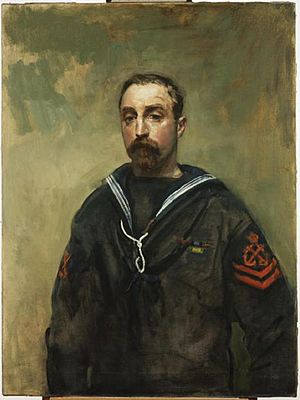Ernest Herbert Pitcher facts for kids
Quick facts for kids
Ernest Herbert Pitcher
|
|
|---|---|

Petty Officer E Pitcher VC, 1918 by Ambrose McEvoy.
|
|
| Born | 31 December 1888 Mullion, Cornwall, England |
| Died | 10 February 1946 (aged 57) Sherborne, Dorset, England |
| Buried | |
| Allegiance | |
| Service/ |
|
| Rank | Chief Petty Officer |
| Unit | HMS Dunraven |
| Battles/wars | First World War Second World War |
| Awards | Victoria Cross Distinguished Service Medal Croix de Guerre (France) Médaille Militaire (France) |
Ernest Herbert Pitcher (born December 31, 1888 – died February 10, 1946) was a brave sailor in the Royal Navy. He was from England and received the Victoria Cross (VC). This is the highest award given for amazing bravery when facing the enemy. It can be given to members of the British and Commonwealth armed forces.
Contents
Ernest Pitcher: A War Hero
Ernest Pitcher was a Chief Petty Officer in the Royal Navy. He was known for his incredible courage during the First World War. He served on special ships designed to trick enemy submarines.
Serving in Secret Ships
During the First World War, Pitcher served on ships called Q ships. These were warships disguised as regular merchant ships. Their job was to trick German U-boats (submarines) into coming close. Once the U-boat was near, the Q-ship would reveal its hidden guns and attack.
Pitcher first served on HMS Farnborough. This ship sank two U-boats. However, Farnborough was also sunk by a U-boat. Most of the crew, including Pitcher, were saved. They then joined another Q-ship, HMS Pargust.
HMS Pargust managed to sink the U-boat UC-29. The crew of Pargust showed great bravery. The Navy decided that the whole crew deserved recognition. So, they held a vote. Two crew members were chosen to receive the Victoria Cross. Pitcher received the Distinguished Service Medal for his actions. After this, Pitcher and his captain moved to HMS Dunraven.
The Dunraven Battle
On August 8, 1917, HMS Dunraven was sailing when it spotted a German U-boat, UC-71. The Dunraven was disguised as a normal merchant ship. It continued to sail in a zig-zag pattern to make the U-boat think it was an easy target.
A Clever Trap
The U-boat came closer, staying underwater at first. Then it surfaced and began firing shells at the Dunraven. The Dunraven fired back with its small merchant ship gun. It also slowed down to let the U-boat catch up. Fake distress signals were sent out: "Help! come quickly – submarine chasing and shelling me."
When the shells started landing very close, the Dunraven stopped. A small group of sailors, called the "panic party," pretended to abandon the ship. This made the U-boat believe the ship was truly helpless.
Facing Danger
The Dunraven was being heavily shelled and was on fire at the back. The U-boat came very close, about 400 yards away. It was partly hidden by thick smoke from the Dunraven's burning stern.
Suddenly, a huge explosion happened at the back of the Dunraven. This was the ship's ammunition magazine blowing up. Petty Officer Pitcher was the captain of the 4-inch gun crew. They were right above this magazine. When it exploded, Pitcher and his crew were blown high into the air. Luckily, Pitcher and another man landed on some fake wooden railway trucks. These soft landings saved their lives.
Even after the explosion, the Dunraven's crew kept up the deception. They hid, waiting for the U-boat to come closer. The U-boat then fired a torpedo, which hit the Dunraven again. Another "panic party" left the ship, making it look completely abandoned. For almost an hour, the U-boat watched the Dunraven through its periscope. During this time, more explosions happened on the burning ship.
Finally, the U-boat surfaced and shelled the Dunraven for 20 minutes. It then came very close to inspect the ship. The Dunraven fired its own torpedoes, but missed. Soon after, British and American destroyers arrived. The wounded sailors were moved, and the fires were put out. The Dunraven was badly damaged and eventually sank the next morning.
Pitcher's bravery during this action was incredible. His gun crew voted for him to receive the Victoria Cross. Another officer, Lieutenant Charles George Bonner, also received the VC for his actions on the Dunraven. Pitcher also received two French awards: the Croix de Guerre and the Médaille Militaire.
After the Great War
In 1920, Ernest Pitcher was promoted to chief petty officer. He retired from the Royal Navy in 1927. He then lived in Dorset, England. He taught woodwork at a boys' school in Swanage. He also ran a pub called the "Royal Oak."
When the Second World War began, he rejoined the Navy. He served on land in the south of England. After the war, his health became poor. He sadly died from tuberculosis on February 10, 1946. His body was brought back to Swanage, where he is buried in Northbrook Cemetery.

